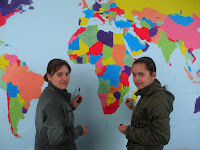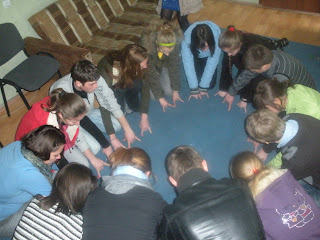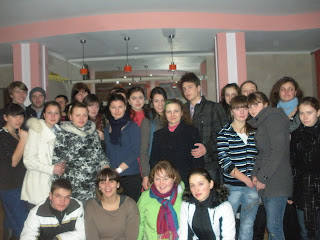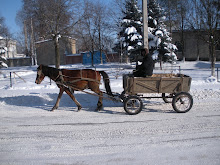
Recall
my trip to
Zachariah's village last December. The purpose of my trip was to facilitate a youth experience exchange between Zachariah's youth group and another youth group in a neighboring village, led by PCV Shannon. Both of these volunteers are facilitating youth initiatives according to the
Public Achievement curriculum.
The previous attempt to have the event was cancelled due to a blizzard, literally. But this time we pulled it off and had a lot of fun doing it. Big thanks to Zach and Shannon for the invitation!
The Purpose
The goals of a youth experience exchange (Schimb de experienta) are rather simple; to give the youth a chance to share their ideas and intentions, learn from one another's experience, and foster new acquaintances.
On the bus ride from the first village to the village were the event took place, we couldn't help but conclude that this afternoon outing was one of the few "field trips" these kids have been awarded. The distance from one village to the other is just 15 minutes by bus, but as a student group, the practice of visiting another group is not yet venerated like the countless youth exchanges an American student leader might attend during his/her high school career.
Standard Beginning
Shannon's facility was a great place to have our event, and after her director and the mayor of the village said a few introductory words, the director introduced the first activity: Human Bingo.
Up until that moment, as my colleague noted, the scene was so terrifyingly typical of high school students it made us cringe. The two groups took seats on opposing sides of the room, looking at the other group but trying as they might to pretend they have not a care in the world. Lipgloss shimmered off the shy smiles of almost every girl in the room, one boy wore a full suit, and though many of the participants introduced themselves as 18 year-olds, I hardly believed they could be 15.
Project Ambitions
Each of the youth groups is working on a community project. At this point, each group has identified a problem in their community and a potential solution. We wanted to give the youth an opportunity to discuss their projects and improve their solution proposals at the youth exchange.
Representatives from each of the groups gave a short presentation about the problems in their respective communities and their potential solutions. Shannon's group yielded the floor for Zach's group (the guests) to present first. Two of the youth described the problem their village: no place for the youth to congregate in their free time (very common opinion in Moldova). Their solution to this problem is to build a youth park, near the school. The youth showed off their sketch of the proposed park, as well as the results of a survey they did in their school, which speaks to the support they have from their peers in undertaking this initiative.
Shannon's group then spoke about the limited access to food in their school cafeteria, the problem they have chosen to attack. Their proposed solution, to provide a tea service service during class breaks, is having trouble attracting the necessary support.
Teamwork

Since both of the groups are rather new, it seemed only appropriate that our interactive break from project analysis came in the form of a team-building activity. The human knot is a perfect way to do this, with groups who have never done it before, because they will participate in the debrief with sincerity. In order to continue the acquaintance building, we mixed the two groups together for this activity.
One team manage to complete the task of untangling themselves. When I asked the group how they succeeded, the common response was perfectly textbook, "We had to listen to everyone's ideas." (Thanks for playing, tell them what they win Bob!)
I asked the other group, which didn't manage to finish the task, if there was a clear leader in their group. "Yes!" They shouted, "Zach!" Hmmmm....
Project Analysis

Keeping the two groups mixed, but divided equally. We spent the next 20 minutes analyzing the project proposals. We decided to use an activity called "Driving Forces," that I found in a Peace Corps manual. It requires the participants to consider the "positive forces" propelling their project forward, and the "negative forces" pushing back the progress. Both groups needed to hear the truth, that they need support of other partners (school directors, other administrators, parents, etc) in order to succeed.
At the end of the day, two participants said that they learned something new about their project through this activity. Thus, my job was done and I went home a satisfied facilitator.
Diplomas, Pizza, and New Friends
At the end of the event, Shannon's director awarded each of the participants a diploma (very important in Moldovan culture). Though I somehow don't have a picture to prove to you...Shannon created beautiful diplomas complete with a photo of yours truly and the title "Moldovan Youth Facilitator." Shannon is amazing like that.
The Mayor of the town took a moment to speak again, awarding the Peace Corps Volunteers who participated our own diplomas too (pictures in the slideshow, above).
Then it was on to the pizza party, where we observed as the youth took it upon themselves to make sure there were youth from each village sitting at each of the tables.
Way to go kids! Job well done!
After seeing how impressed youth from Shannon's group were with the youth from Zach's group, and vise-versa, I am once again convinced that experience exchanges are the way to go in youth development here. It hardly matters if I, an American, go to a group of youth and tell them they can be the change they want to see. If they hear it and see it being done by their neighbors, the youth are much more likely to believe that they can do it too.




























































